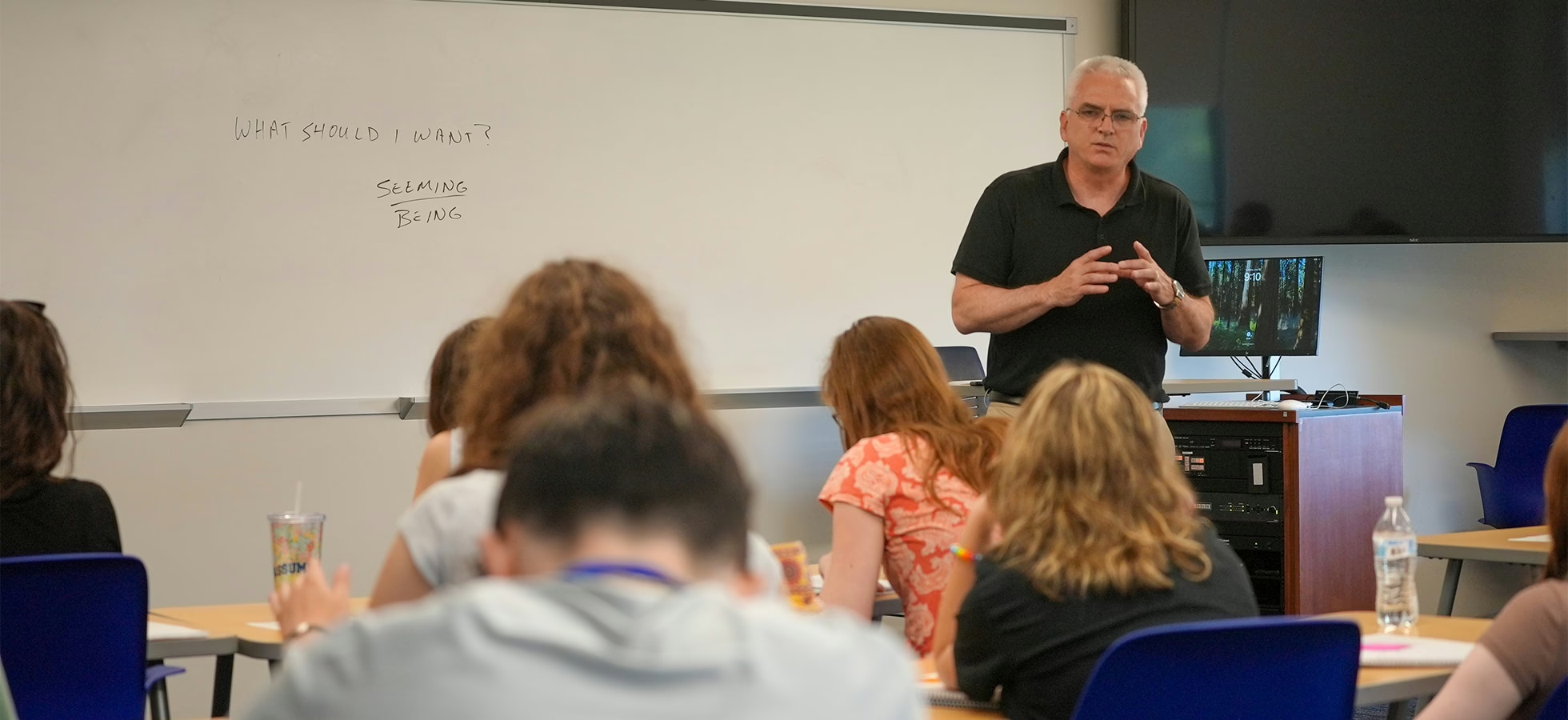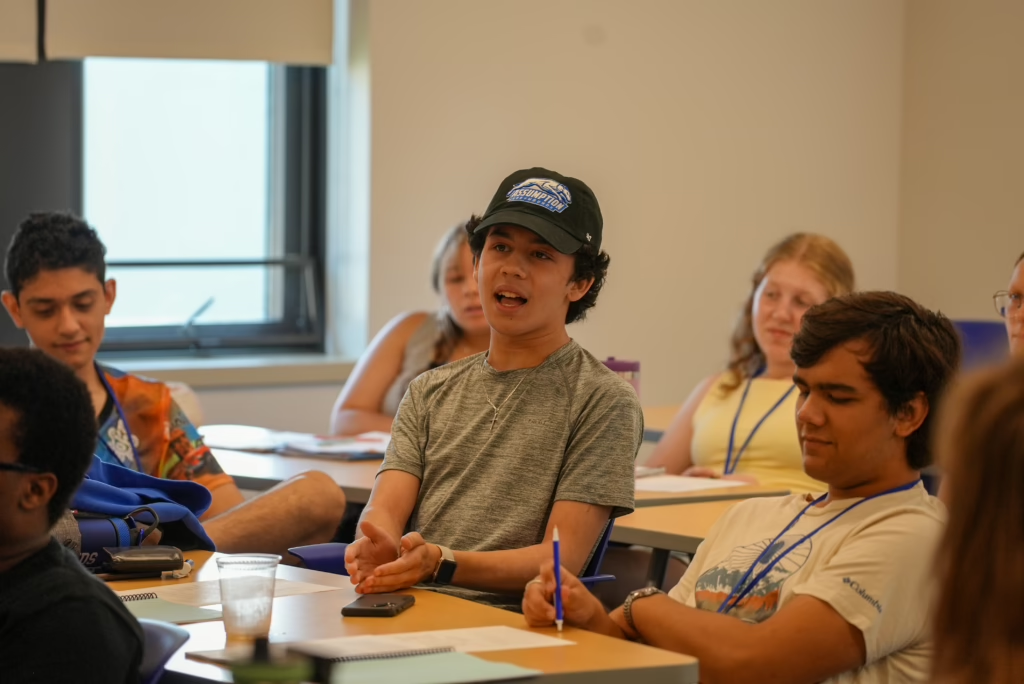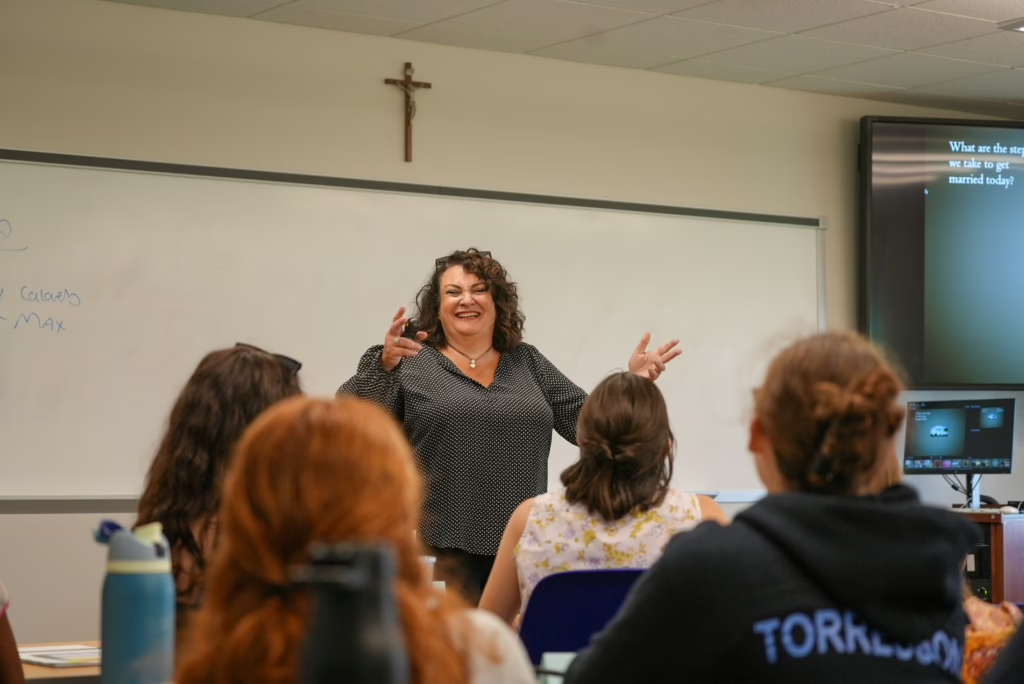Asking the Biggest Questions: Inside Assumption’s Core Texts and Enduring Questions Program

Assumption’s Core Texts and Enduring Questions (CTEQ) minor offers students the opportunity to prepare for more than just their future careers. While the average college graduate will change professions three times and hold seven jobs over the course of their career, they will only ever live one life.
“This program is for the kind of person who is ready to make a deeper connection with ideas,” says professor of philosophy and program director Daniel Maher. “They’re going to work 40 or 50 or 60 hours a week at their jobs, but they’re still going to be human beings at the end of it. We ask students to take their humanity seriously and help them to encounter books that open their mind.”
In 1979, the Fortin and Gonthier Foundations of Western Civilization Program was established as an introduction to the liberal arts for Assumption students. Founded and generously supported by Donald D’Amour ’64 and Michele D’Amour HD’10, the program was inspired by D’Amour’s formative experience at Assumption.
“He loves Assumption because of the life that it gave him,” Maher says. “He wants to make sure that this place always provides that kind of education, the kind that truly transforms people’s lives.”
In 2017, Provost Marc Guerra revitalized the Foundations of Western Civilization program and led its transformation into the current Core Texts and Enduring Questions program. Far more than an average Great Books course, CTEQ’s theological emphasis brings students face to face with some of life’s biggest questions, including the prospect of divine revelation.
“The core of the program takes this book, the Bible that we are told is the revealed word of God, and takes it seriously as an intellectual proposition,” Maher said. “We don’t try to catechize people or preach at them. We explore revelation in the ancient and modern contexts, because while modernity shows us things – it also obscures. In the spirit of Pope Benedict, we believe the question of God is one that can and should be approached intellectually.”
Integrating the four disciplines of theology, art history, philosophy, and political science deeply influences the way that students, regardless of major or future career plans, understand the world.
Philosophy: Engaging Left & Right Brain – Harrison Puntillo ’27
Harrison Puntillo ’27, a cybersecurity major, discovered CTEQ through his required Foundations Program courses, enjoying them so much he decided to select CTEQ as a minor.
“I was grateful that I was able to try a bunch of different things with Foundations,” he says. “I enjoyed how thought-provoking my first theology, art history, and philosophy courses were. And when I found out CTEQ was a blend of those programs, as well as political science, I knew it was perfect for me.”
Cybersecurity and CTEQ may seem an unlikely pairing, but Puntillo has found that having CTEQ as a minor alongside his cybersecurity major has empowered him to engage in both analytical and more philosophical, discussion-based courses.
“As a cyber major, I appreciate balancing my more technical classes with classes that explore more open-ended problems,” says Puntillo. “With CTEQ, you have so many discussions about the world that lead you to learn more about yourself, the values you hold, and how you see things by discussing it with other people who may agree or disagree with you. In cyber, it’s so helpful to build that critical thinking. You want to be able to adapt to new things.”
Art History: Sharing Her Passion – Savina Villani ’27
Savina Villani ’27 is a theology and music double major who found CTEQ to be a profound influence within and beyond the classroom. Alongside her academic pursuits, Villani is Assumption’s organ scholar, awarded to a single student only once every four years.
“CTEQ was hugely impactful on my road to becoming the organ scholar,” she says. “It really pushed me to think about humanity in a transcendent way. And when I’m pushing myself to think that way about things, I want to share that gift, and my gifts, with other people. I got involved with singing and playing the organ, and I think CTEQ nudged me in that direction – to help not only myself by developing my own thoughts, but also in sharing that with other people.”
Villani also notes that CTEQ has brought her closer in community with others, including in some unexpected ways.
“We have all these unique properties that separate us from animals – language, the ability to create things, and relationships – that’s what really makes the human experience unique. CTEQ encourages the spirit of exploring the human community,” she says. “When I’m reading Saint Augustine, I’m interacting with him, even though he lived more than 1,000 years ago. That connects us and creates community across space and time. It’s changed everything about the way I view things.”
Political Science: Considering Life Beyond Assumption – Christopher Cox ’26
Christopher Cox ’26, a political science major, has had his eyes opened to how each of the four CTEQ disciplines coalesce to provide a different view of the world.
“The course ‘Saint Augustine’s City of God’ takes philosophy, theology, and political science and puts them all together, making you think about all three in relation to each other, to yourself, and to our society,” says Cox. “It truly makes you reflect about more than just being here at Assumption. I don’t know if any other course can really do that.”
Cox emphasizes that CTEQ helped him to better understand Assumption’s mission and how the humanities can shape someone’s life.
“CTEQ is truly a unique experience that makes you just think about being a better human. It’s the program on campus that illuminates that specific part of the mission statement,” says Cox. “It opened my eyes, and I think it will open anyone else’s eyes.”
Theology: Deepening her Faith – Elaine Danas ’24
Elaine Danas ’24, who graduated with a management degree and now works as a forensics laboratory administrator, found that CTEQ presented the opportunity to learn more about her faith.
“I think the most standout courses for me were in theology,” she says. “I have a Christian lifestyle, and I think those courses were what really kickstarted, for me, learning about who God is, what we’re doing here, and what our relationship with Him is. Those courses bolstered my personal relationship with my faith, and I don’t think I would be where I am now without them.”
Danas found a strong connection with her professors in the CTEQ program as well, sharing that their motivation and willingness to have discussions, and their deep understanding of the program, helped enhance her Assumption experience as a whole.
“The professors that teach in the program are so intelligent and unique in their own ways, and no matter what class you’re taking in the program, you’re going to learn something really interesting that’s going to change you in some way – if not now, then down the line,” she says. “It was great to get to know them personally, and that made my education so much richer and more fulfilling.”
Beyond the Classroom
CTEQ’s impact stretches far beyond the classroom setting, with story hours each semester that bring students, faculty, and staff from across disciplines together to read and discuss a piece of literature related to the core academic themes of CTEQ.
“It’s great to see in an informal setting how the faculty from across disciplines think outside of the classroom,” says Cox. “Story hour sets aside the time to consider issues that might not be covered in a traditional, semester-long course – or to see those issues from a new perspective.”
Current high school students interested in the liberal arts can also experience CTEQ, through the CTEQ Pre-College Summer Program. During the week-long program, students live on the Assumption campus and interact daily with students and faculty in the CTEQ program.
“It’s so amazing having high school students come to the campus in the summer and see them articulate their thoughts,” says Danas. “It’s rewarding and so fun to get to know them and introduce them to college life not only academically, but socially, too.”


Professor Elissa Chase leads a CTEQ summer class.
“We’re seeing that high schoolers are increasingly apprehensive about college,” says Maher. “They worry about making friends, succeeding academically…and then they come in, and it takes an hour once they’re here – they immediately connect with the other kids. They go to class, they find out what makes sense, and they get to think about things.”
During the course of the week, rising high school juniors and seniors take CTEQ courses, travel on field trips to museums such as the Isabella Stewart Gardner Museum, and have the chance to engage in social aspects of what being in college is like, such as karaoke nights in Pierre’s Pub. The program also offers interested first-year students a renewable $1,000 tuition remission scholarship to help ease the stress that comes with the cost of college.
Beyond the impact on current and prospective students, CTEQ hosts biannual symposia that foster connections and community between alumni and current students of the program in the spirit of lifelong learning. This past spring, the discussion centered on Shakespeare’s Measure for Measure and All’s Well that Ends Well.
“It’s gratifying to see,” says Maher. “You can have two dozen alumni – and we’ve had symposiums with representation from every decade starting with the sixties – and they come back to campus, some traveling in from out of state, to discuss these timeless works of art and literature with each other and our current students. We cultivate intellectual friendships and the fruits of a liberal arts education across a lifetime.”
